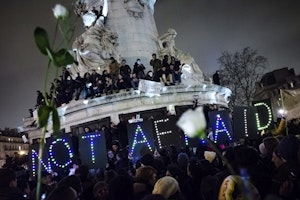A Paris-Based Media Outlet Reacts to the Attacks
By Daniel Makonnen

On November 13, Paris suffered its second terrorist attack in a year. Over a hundred people were killed, and many other victims, severely injured, are clinging to life in hospitals. Johan Weisz-Myara, publisher of the Paris-based online news magazine StreetPress, talks about the mood in Paris today and the media’s role in organizing democratic resistance.
What is the mood like in Paris since the attacks? Is it any different than after the attacks on Charlie Hebdo and a kosher supermarket in January?
The Charlie Hebdo attacks targeted certain individuals for a specific reason, explicitly given by the terrorists: the caricatures of the prophet that had been published several times in the magazine. This time, the people of Paris and the suburbs in the wider sense were targeted. People feel affected in a more direct way—everyone knows someone or knows someone who knows someone who was injured or killed by the terrorists. These days in Paris and in the suburbs, there is a heavy feeling of sadness and grief, counterbalanced by a strong will to hold on to life, to remain open, and to support those who are suffering.
A popular concert hall, hip restaurants and cafes in a young, multicultural neighborhood—why do you think the terrorists chose to target these places?
I think we should avoid misunderstandings on this. The terrorists had planned attacks on places they knew would be crowded on a Friday night: a football stadium, a major concert venue, very popular bars and restaurants, places where people gather in masses. I do not believe we should post-rationalize the killings as an attack on people who drink wine, who listen to music, who have a certain lifestyle. The main message of the terrorists is that this can happen to everyone.
Let’s be mindful that, in parallel to the attacks at the Bataclan (the concert venue) and at bars and restaurants in the center of Paris, a massive bomb attack was planned at the Stade de France (the French national stadium in the northern suburbs of Paris), where tens of thousands of people of all kinds of ethnic and social backgrounds were gathered to watch a football game. If the terrorists had managed to enter the stadium, this could have been a massive tragedy.
One of your reporters was at the Stade de France during the attacks. What is the mood like in the suburbs at the moment?
Everyone is as sad, shocked, and affected as in the center of Paris. Twelve StreetPress journalists are currently reporting from Paris and from the suburbs. They tell me that the mood in the suburbs is as heavy and depressed as it is in Paris—no difference.
A few days ago, similar terror attacks took place in Beirut. After the Paris attacks, how do French people relate to what happened in Lebanon?
The Beirut attacks seemed far from us, like the Garissa University tragedy in Kenya, where 147 students were killed by al-Qaeda terrorists. In our minds, those incidents happened in faraway places, and we were somehow protected from that. In France, we are not prepared to live with the risk of attacks that could happen at any moment. But now we will have to cope with it.
Frankly, our society is full of resources. It will reorganize and reimagine itself in light of the recent attacks.
In your opinion, how did the French media handle the attacks? What should be the responsibility of the media in such situations, and how are the various dynamics at play affecting your editorial choices?
The mainstream media did well at providing raw information and hard facts. However, at StreetPress, we practice a type of journalism focused on public debates and in-depth analyses. We will particularly aim to offer a platform for expression for the young generation, which was hit hardest by the attacks on Friday night. In the coming days, we are going to publish articles by young journalists and will organize live debates between our journalists and our readers.
Under the state of emergency promulgated by the French authorities, public gatherings in physical public places are unauthorized for an indefinite period of time. In this context, I believe the media should fully embrace its role as an open space for public debate.
Many positive grassroots initiatives emerged on social media after the attacks. Can you tell us more about these?
In the first 24 hours, social media had a strong positive impact. Streets around the places that were attacked were blocked by the police for two to three hours; hence, survivors of the attacks tried to escape from the areas at risk, but could not find shelters and were left vulnerable on the streets. As a response, social media users launched the hashtag #PorteOuverte (#OpenDoor) to encourage people living in the neighborhood to open their homes to survivors of the attacks, some of them injured. This is a positive use of social media, and I hope such practices will continue.
StreetPress is a French-language publication that covers marginalized communities in France and is a grantee of the Open Society Foundations.
Until January 2020, Daniel Makonnen was a senior communications officer with the Open Society Foundations.


